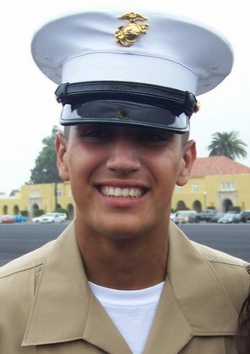This Week's U.S. War Casualties
The deaths of 10 U.S. service members in Afghanistan were announced this past week by the Department of Defense.
The youngest soldier killed was Marine Cpl. Richard A. Rivera Jr., 20, of Ventura, Calif. He was killed August 10 when a new Afghan policeman was handed his weapon and immediately opened fire in the Sangin district of Helmand province. Two other Marines were also killed, Staff Sgt. Scott E. Dickinson, 29, of San Diego, Calif. and Lance Cpl. Gregory T. Buckley, 21, of Oceanside, N.Y.
On Friday, Rivera's casket was met by his family at the Naval base in Ventura County. Cpl. Rivera was a high school linebacker even though he weighed just 160 pounds at the time, his family told the Ventura County Star.
 Rivera (pictured at right) was close to his grandfather, an Army veteran who served in Vietnam and gave Richard his keepsakes from his war experiences. "Deep down, Grandpa didn't want him to go," said his cousin, Brianna Rivera.
Rivera (pictured at right) was close to his grandfather, an Army veteran who served in Vietnam and gave Richard his keepsakes from his war experiences. "Deep down, Grandpa didn't want him to go," said his cousin, Brianna Rivera.
The three slain Marines all were assigned to 3rd Battalion, 8th Marine Regiment, 2nd Marine Division, II Marine Expeditionary Force.
Also on Friday, three other Marines died in a separate "green on blue" attack after reportedly sharing a meal with another Afghan policeman. Capt. Matthew P. Manoukian, 29, of Los Altos Hills, Calif.; Gunnery Sgt. Ryan Jeschke, 31, of Herndon, Va.; and Staff Sgt. Sky R. Mote, 27, of El Dorado, Calif. were killed. They served in the 1st Marine Special Operations Battalion, Camp Pendleton, Calif.
Mote posted the picture atop this blog post to his Facebook account in 2006. His friend Elyse Roques responded, "You are ALMOST as big of a dork as your brother."
The writer Evan Wright was embedded in Iraq with a battallion that included Jeschke. He quoted him in the book Generation Kill about a traumatic experience where a young Iraqi girl was killed when a car refused to stop at a roadblock and Marines opened fire. Jeschke, then 22, told the author:
"War is either glamorized -- like we kick their ass -- or the opposite -- look how horrible, we kill all these civilians. None of those people know what it's like to be there holding that weapon. After [another Marine] and I went up to that dead girl, I was surprised, because honestly, I was indifferent. It's kind of disturbed me. Now, sometimes, I think 'Am I a bad person for feeling nothing?'"
A YouTube video shows Jeschke competing in a 2008 grappling tournament in San Bernardino, Calif. (he's in the black shirt).
On Aug. 15, Pfc. Andrew J. Keller, 22, of Tigard, Ore., died in Charkh when enemy forces attacked his unit with small arms fire. He was assigned to the 1st Battalion, 503rd Infantry Regiment, 173rd Airborne Brigade Combat Team, Caserma Ederle, Vicenza, Italy.
Also on Aug. 15, Staff Sgt. Eric S. Holman, 39, of Evans City, Penn., died Aug. 15, in Ghazni province when he was hit by an improvised explosive device (IED). Holman was assigned to 192nd Ordnance Battalion, 52nd Ordnance Group, 20th Support Command, Fort Bragg, N.C.
On Aug. 16, Pfc. Michael R. Demarsico II, of North Adams, Mass., died in Panjwa'l of wounds suffered in an IED explosion. Demarsico served with the 1st Battalion, 23rd Infantry Regiment, 3rd Stryker Brigade Combat Team, Joint Base Lewis-McChord, Wash.
This Week's U.S. War Casualties
The deaths of nine U.S. service members in Afghanistan were announced this past week by the Department of Defense.
Army Staff Sgt. Matthew S. Sitton, 26, of Largo, Fla., was killed Aug. 2 in Kandahar province. Sitton, who was married and had a nine-month-old son Brodey, was on foot patrol when he stepped on an improvised explosive device, the Tampa Tribune reported.
The TV station WFLA filmed the arrival of his body at McDill Air Force Base, where his casket was met by his wife Sarah and other grieving relatives. "Every future plan that I ever had was based around him, so when I heard that news everything stopped," said Sarah (pictured above with her husband).
Sitton was the second member of a high school graduating class of 50 to die in Afghanistan. He was friends and baseball teammates at Indian Rocks Christian High School with Frank Gross, who was killed in July 2011 when an IED caused his vehicle to roll over in Khost province.
Just three months into his first deployment, Navy Petty Officer 3rd Class Clayton R. Beauchamp, of Weatherford, Texas, was killed by an improvised explosive device Aug. 7 when enemy forces attacked his unit during a dismounted patrol in the Shaban district of Helmand Province.
Beauchamp, 21, signed up for the Navy when he turned 17 and joined after graduating Weatherford High School in 2009. His older brother Christopher, 27, and younger sister Cheyenne, 19, also serve in the Navy. "He had a knack for making everyone around him better," his father, Jack Beauchamp, told the Fort Worth Star-Telegram.
 Beauchamp (pictured at right) was assigned to the 1st Battalion, 1st Marine Regiment, Regimental Combat Team 6, 1st Marine Division (Forward), I Marine Expeditionary Force (Forward), Camp Pendleton, Calif.
Beauchamp (pictured at right) was assigned to the 1st Battalion, 1st Marine Regiment, Regimental Combat Team 6, 1st Marine Division (Forward), I Marine Expeditionary Force (Forward), Camp Pendleton, Calif.
The rest of the casualties:
Army 1st Sgt. Russell R. Bell, 37, of Tyler, Texas, died in the same IED blast that killed Sitton. They were assigned to the 1st Battalion, 508th Parachute Infantry Regiment, 4th Brigade Combat Team, 82nd Airborne Division, Fort Bragg, N.C.
Marine Cpl. Daniel L. Linnabary II, 23, of Hubert, N.C., died Aug. 6 during combat in Helmand province. He served in the 2nd Tank Battalion, 2nd Marine Division, II Marine Expeditionary Force, Camp Lejeune, N.C.
Army Spc. Ethan J. Martin, 22, of Lewiston, Idaho, was killed Aug. 7 by enemy small-arms fire in Koragay. He was assigned to 1st Squadron, 40th Cavalry Regiment, 4th Brigade Combat Team (Airborne), 25th Infantry Division, Joint Base Elmendorf-Richardson, Alaska.
Air Force Maj. Walter D. Gray, 38, of Conyers, Ga., died Aug. 8 of injuries suffered during a suicide bomb attack in Kunar province. Gray was part of the 13th Air Support Operations Squadron, Fort Carson, Colo.
Army Maj. Thomas E. Kennedy, 35, of West Point, N.Y., and Command Sgt. Maj. Kevin J. Griffin, 45, of Laramie, Wyo., died Aug. 8 in Kunar province when a suicide bomber detonated an explosive vest. Kennedy and Griffin were assigned to Headquarters and Headquarters Company, 4th Brigade Combat Team, 4th Infantry Division, Fort Carson, Colo.
Army Master Sgt. Gregory R. Trent, 38, of Norton, Mass., died Aug. 8 in Bethesda, Md., from wounds suffered eight days earlier in Baktabad when enemy forces attacked his unit with small-arms fire. He was part of the 4th Battalion, 3rd Special Forces Group (Airborne), Fort Bragg, N.C.
As of Wednesday, 1,941 members of the U.S. military have died in Afghanistan as a result of the U.S.-led invasion in 2001, according to Associated Press.
Why Woodward and Bernstein Didn't Blog
I'm a big fan of Josh Marshall's political reporting at Talking Points Memo, but he makes a rookie mistake in a reader email he quotes this morning. MB, a regular correspondent on Wall Street matters, offers this bit of advice to Marshall:
I know you raised some money from Marc Andreesen. I would bet Marc's fund and Bain Capital have some investor overlap. I'm sure you've already made that call, but I bet that Marc has no love lost for Romney as Marc is truly in the "job creation" business whereas Romney is a "financial engineer/takeover artist." Also, the more recent Bain funds have not performed as well as they did when Romney was there (but are still successful). Bain charges some of the highest fees to investors in the industry (in part because of their track record of success under Romney). I wonder if you dug around you could find a disgruntled limited partner or two in the Bain funds who'd be willing to be your [source] on this issue or on the industry in general.
This seems like a pretty good suggestion. If more people at Bain would be privy to knowledge about Romney's taxes than just his accountants, the chances of finding one of them to confirm or deny Sen. Harry Reid's allegation are greater. Marshall's relationship with TPM investors gives him some phones to work in pursuit of the story.
But what happens in the next three months if Talking Points Memo breaks a huge scoop from an undisclosed source with inside knowledge of Bain?
Everyone's going to think it was Marc Andreesen -- or someone Andreesen told Marshall to call.
Marshall has managed to burn a source who didn't even tell him anything yet.
Credit: Angry photo of Marc Andreesen taken by J.D. Lasica under a Creative Commons license.
Tomorrow I Will Experience Congress
I love the smell of democratic governance in the morning.
I'm back in Washington, D.C., to meet with members of Congress and their aides as part of the Interactive Advertising Bureau's Long Tail Fly-In. Around 50 web publishers have paid our own way to come to D.C. to explain how Google AdSense and other contextual ad networks power small businesses.
This is my third year attending the event. We spend one day talking shop about web publishing and learning about new web privacy legislation, then spend the next marching around the halls of Congress to explain that some of that legislation will kill our businesses and force us to return to a life of crime -- or whatever it was we did before the web came along.
(I was in the newspaper business. Don't make me go back there!)
When I was interviewed by AdWeek about the event, I tried basically the same approach on the reporter I'll be using on Rep. ToBeDetermined and Sen. NotSureYet. I've been publishing on the web since 1995 and ran sites before AdSense came along. Ads were completely untargeted, aggravated users because they didn't relate to their interests and didn't earn squat. Now, with ads that use anonymous cookies to learn some demographics about the audience, I've been able to publish the Drudge Retort for eight years.
I could not afford to do that without this ad model, given server hosting costs of around $7,400 a year on a site that gets two million hits a month. AdSense helped my blogging hobby get completely out of hand and turn into a small business. (Some of the Retort's conservative users believe that this experience in bidness will turn me Republican. I have thus far avoided that fate.)
I'll have more to say about the privacy concerns and the pending legislation this week, after I hear from the main policy wonk at the IAB. The biggest issue is likely to be the browser do-not-track header, which Microsoft is turning on by default in Internet Explorer 10.
There are over a million people using contextual ads to fund full- or part-time businesses. Google has paid $30 billion to AdSense publishers in the decade since the service began. Even during the worst of the 2008 economic crash, ad-supported online sites were a part of the economy that was growing.
As one of the only political bloggers who attends this event, I talk on Capitol Hill about the thousands of independent news sites and blogs that fund themselves through this model. You can publish a commercial news site or blog today and be beholden to no one.
I worry sometimes that the thought of getting rid of bloggers will be viewed as a plus by some members of Congress.
Last year, our efforts were unfortunately timed. Israeli Prime Minister Benjamin Netanyahu showed up on the same day to address a joint session of Congress, and the members all decided to hear him speak instead of us. I did get to wave to Sen. Amy Klobuchar (D-Minn.) as she left her office, but was unable to convey the importance of contextual advertising through a hand gesture.
Kim Polese is a Cautionary Tale?

There's a dreadful sexist commentary on Forbes magazine today by Eric Jackson that suggests early Java executive Kim Polese caused herself to be wildly overhyped and the same mistake could be happening today to Facebook chief operating officer Sheryl Sandberg.
Under a headline that dubs each woman a Silicon Valley "It Girl," Jackson makes comparisons between the two women that all relate to gender, aside from flimsy observations that "they both like(d) magazine covers and editorial spreads" and "they both get (got) ranked on different arbitrarily created rankings of important people/power lists by business publications."
Making matters worse, he doesn't know his '90s dot-com history.
I was following Java closely in 1997 as I cowrote my first edition of Teach Yourself Java in 21 Days.
Polese wasn't a poor choice for Time magazine's 25 most influential people that year. The Java language had exploded in popularity since being included in the Netscape Navigator browser two years earlier. Polese and three core members of the team that created Java at Sun Microsystems, Arthur van Hoff, Jonathan Payne and Sami Shaio, all left together to start Marimba. It was widely viewed as the first hot startup to build on the technology, which was as big in Silicon Valley then as social networking is today. Polese had named Java, served as its product manager and became one of its best-known evangelists.
If you're a list-making journalist looking for somebody associated with Java to be the face of the trend, Polese was one of the top choices.
"History doesn't remember Kim Polese so well," Jackson claims, but Polese led Marimba to its public offering in 1999 and profitability. In 2004, the company was sold to BMC Software for $239 million. Though that's not as successful as people expected it to be in the heady days of the launch, it wasn't a flop. Any software startup that rode out the dot-com bust and sold for nine figures afterwards was doing something right.
Jackson writes that her next venture, SpikeSource, "seems to have quickly gone out of business." The company launched in 2003, Polese became the CEO a year later and it was in business for six years as an open-source infrastructure developer before folding.
So that she doesn't end up a sad "cautionary tale" like Polese, Sandberg should get back to her job and stop accepting so many awards and magazine covers, Jackson advises:
Maybe you should tone down the public appearances for a while and just keep your head down at Facebook. That doesn't mean do no public appearances or keep your light beneath a bushel. It just means to keep a balance more between the internal job and external stuff. There will always be some new Fortune Magazine cover to do, or award for being the most powerful woman executive in the world to accept.
(Any Facebook exec who thinks magazine covers will "always" be there should call the people running MySpace -- if their phones still work.)
Eric Jackson is a cautionary tale on how not to write about women in tech. Since publishing the commentary, he has deleted a line about how Sandburg's husband is "super-smart to boot" and another telling her to "just keep your head down at Facebook" -- without noting the edits were made. People are lining up on Facebook and Twitter to work him over.
The same year Polese made the Time 25, I taught myself Java and applied for a job at Marimba.
I'm still waiting to hear back.
Related links:
- Kim Polese's response: Stop Comparing Female Execs and Just Let Sheryl Sandberg Do Her Job
- Jackson's Apology to Sheryl Sandberg and Kim Polese
Credit: The photo of Kim Polese was taken by Dan Farber and is available under a Creative Commons license.
Steve Elling Mocks Overweight TPC Fan
While covering the first round of the Players Championship Thursday at TPC Sawgrass in Ponte Vedra Beach, Fl., CBS Sports golf columnist Steve Elling made a really ugly crack about an overweight fan in the Tiger Woods gallery:
A distinctly rotund, lava-lunged woman was following the former world No. 1 all day, and was making no secret of her level of adoration for the 36-year-old. Make no mistake, the players in Tiger's threesome were tracking the hilarity, too, as Woods had to repeatedly fight a smirk. ...
To put it politely, the woman looked like 300 pounds of cottage cheese stuffed into a 200-pound sack.
Elling liked mocking this woman's size so much that he devoted the lead and conclusion of his commentary to her, calling the fan and the challenge faced by Woods both "large and unavoidable." He also posted seven insulting comments about her on Twitter:
1: "Cabrera's WD announcement was 2nd-biggest laugh of day. First was every time the 300-pound female fan tracking Tiger today opened her yap."
2: "@HolterMedia Rinaldi was flustered probably because he was terrified that she might fall over and crush him."
3: "The 300-pound woman kept calling Tiger 'baby doll' and Mahan and Fowler nearly had aneurisms trying to keep from laughing."
4: "I misspelled aneurysm. Probably cause a vessel burst in my head when 300-pound woman bent over and her unmentionables nearly toppled out."
5: "After that 74 today, Tiger should be happy to have any fans out there cheering for him. This woman should have counted as two."
6: "I stand corrected. Shotlink had the woman at 400 pounds. Ha ha."
7: "@sallbee87 Yeah, he was responding to my question about the corpulent woman who was following him and calling him 'Baby doll.'"
I've attended the Player's Championship several times in recent years, and the expectations of fan behavior are really high. There are dozens of volunteers on the course asking for you to be quiet and stay still while players make shots, and cell phones were not allowed at all on the grounds until this year. Most fans are extremely polite, even around the island green at 17 where you can lounge around the hole all day long drinking beer -- and hundreds do exactly that.
Elling wrote a commentary in 2010 about how golf "has forever been a spectator sport where decorum rules, sportsmanship reigns and nary is heard a discouraging word."
A pity that sense of decorum isn't shared by Elling.
After publishing this post Friday afternoon, I heard from Peggy Howell, the PR director of the National Association to Advance Fat Acceptance, a group that fights weight discrimination. She called Elling's comments "immature" and said in an email, "I find it really interesting that this man is so full of fat hatred and bias that he can't focus on doing his job. Was he there to report on the fans or on the tournament? So now there's a size limit for attending sporting events?"
She added, "The fact that this woman was able to follow the tournament the entire day says quite a lot for her fitness level, doesn't it? Guess it's not true that all fat people are lazy slobs who do nothing but sit on our couches eating junk food all day!"
Howell's point about following a golfer's gallery is a good one. I've done that at TPC Sawgrass and you have to walk and climb hills all day long to keep up in the Florida heat. It's much easier to park your butt somewhere and let the golfers come to you.
Elling hasn't retreated from his comments on Twitter, but the "300 pounds of cottage cheese" insult disappeared from his column this morning.
Ironically, he's on Twitter today criticizing gender discrimination at the Masters.
Tech Journalist Quits the Internet
Paul Miller, a blogger who covers tech for The Verge, is quitting the Internet for a year. He'll continue to file stories for the site by pioneering a revolutionary new technique in online journalism: Calling people on the phone.
Here's how Miller imagines the phone-driven journalism process working:
"I'm going to try to use the six degrees of separation a little bit," he said on Tuesday afternoon in an interview -- by phone, of course. "I have a lot of co-workers and they know a lot of people and so anybody I can get a phone number for I'll call that person and maybe they have a phone number for another person. So I'll have to follow that sort of chain."
I have some experience practicing journalism without an Internet. The life he romanticizes of gathering information through phone calls, library research and good old fashioned shoe leather was mine at the Fort Worth Star-Telegram from roughly 1989 to 1994.
The job was great, but being a reporter became so much better when the web arrived. At least until some guy named Craig started killing all the newspaper jobs. No longer did I have to annoy sources and prowl libraries for each morsel of news I could gather. The entire world was serving up an all-you-can-eat information buffet on every subject under the sun -- and some of it was even factual!
The only things I miss about the old days are the sexy reference librarians with corrected vision. Tina, Linda, Carol, Dennis. Sigh.
Contrary to what Miller thinks, when calling people by phone you don't have to get their number through word of mouth. There are huge books published each year that list phone numbers. I wish I could tell him this in an email.




